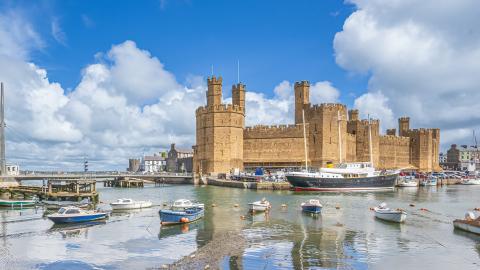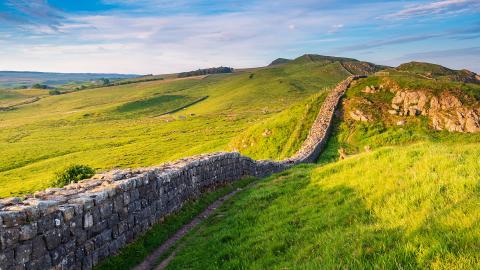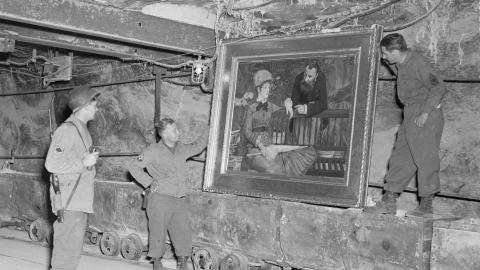
'Nelson defeated the French single-handedly': Al Murray on his new show
In Why Do The Brits Win Every War, Al Murray and a host of famous faces join forces to uncover the truth behind Britain’s military past. Together with his alter ego The Pub Landlord, Al is on a quest to unpick the Great British psyche and understand whether the Brits are helped or hindered by their experiences in war.
Sky HISTORY spoke to Al over video call, to chat about the show and found out why he thinks the British are so fixated by their military history?
Sky HISTORY: What is the premise of Why do the Brits win every war, and why you wanted to make the series?
Al Murray: This is show is the offspring of 'Why Does Everybody Hate the English?' We felt that the format of me with a comic from another country talking about that country's relationship with the English or the British or whatever - because after all these terms are all pretty elastic - would be fun. I'm interested in military history as well so we sort of wanted to direct to kind of onto a bit more of my patch.
I also think that very often you need to ask a big, bold and - basically - daft question, to chuck all the chips into the air and see where they land. I think we've done that and made six really interesting episodes. They are all very different because of the different co-contributor, and also the subjects have a completely different texture.
If you were to ask the Pub Landlord 'Why do the Brits win every war ?' what would his answer be?
Practise. Practice makes perfect. But semi-seriously, there's a lot to that. Certainly, in the 200 years when the British Empire was in its ascendancy and able to throw its weight around, the British state was good at war. And I have to qualify because with all these labels once you start to peel the onion, they all fall away.
Look at the Battle of Waterloo, there's a British general in charge and there are some British soldiers present, but there's also lots of Dutch and Germans from various city-states and principalities joining in, as well as Prussia. In that case, the British won that one because we had an awful lot of help.
![]()
Following on from that how do you feel about history often being streamlined into a simple narrative?
My problem is that the simple narrative usually is nowhere near as interesting as the complex narrative of what happened as in the Battle of Britain which we talk about in the series.
There is an idea of the Battle of Britain of 'The Few' with Britain with its back to the wall but that's not really what happened. It certainly may have felt like that for some people but on the other hand, the RAF fighter command was prepared for the exact encounter that came their way while Germany simply wasn't. The people up against it in the Battle of Britain were the Germans, but no one wants to hear that.
There's the history that belongs to the academics and there's the stuff that's escaped that belongs to people. That's in the films, the entertainment, the novels and in pub conversations. That history is very often plain wrong but people use it to tell a story about themselves and I think that is really interesting. Which would you rather be: 'The Few' nobly defending civilisation or a ruthless war machine ready for all comers? I know which story I'd rather tell about myself.
What explains this peculiar British fascination with military history?
The Second World War. It's completely central to how we view ourselves as a country. When I grew up in the 70s and 80s, the Second World War was everywhere. It was in the Action Man and Airfix models you played with, the Commando War comics and the war films on the bank holiday like The Great Escape and The Eagle Has Landed. Some of the self-image that grew up with those stories that were told in the 60s and 70s and 80s about what the war meant to our culture has seeped into everything and it's very hard to shake off.
Also, you could argue uniquely in the history of British military endeavour, we were up against proper villains rather than competitors or co-agitators. The Nazis offer a moral perspective that isn't there, as clearly, when you look at other wars and conflicts. That's why we think of ourselves as a militarily successful country because of the Second World War which is back-projected through everything else.
Did taking part in the shoe challenge any misconceptions, you had about Britain's military past?
Not particularly but there were just some things I didn't know anything about? With the Vikings episode, before the programme, I knew nothing about them. What was interesting was discovering that there there's no such thing as the Vikings. That's a word that means raiding. It's not talking about who they were, which factions they were which tribes which kingdoms they came from. It's an 'othering word'.
The Vikings weren't Christian and that's the problem because they didn't play by the rules. In that period of early Middle Ages history, people are very much bashing each other over the head all the time. But if you're doing it in a Christian context then you're OK. If you turn up as a heathen then bash people in the head, then you're completely out of order.
I didn't know any of that or about their global trading network. They were plugged into the Silk Road that went all the way to China through Afghanistan and Istanbul. They were using Afghan iron ore to make their best swords.
After filming the series who Do You Think is Britain's greatest military hero and who would the Pub Landlord choose?
The Pub Landlord would choose Nelson because as he sees it, Nelson defeated the French single-handedly. But for me, I'd say Hugh Dowding who set up the Dowding system [Britain's air defence network] which is why Britain won the Battle of Britain that tipped the war in their favour.
















